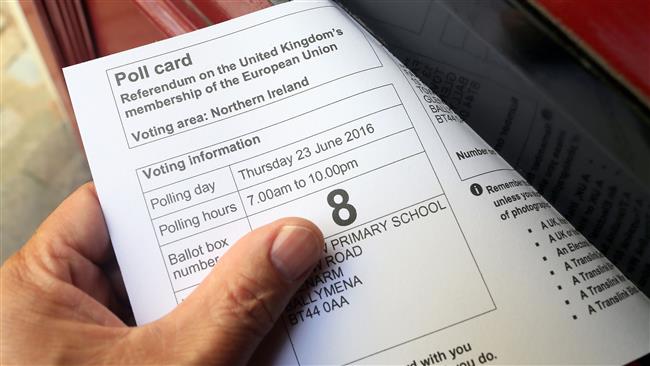UK votes on continued membership in European Union


Britons go to the polls in a much-anticipated referendum on whether the United Kingdom should remain a member of the European Union (EU) or leave the 28-member bloc.
Polling stations opened at 6:00 GMT (7:00 a.m.) on Thursday, allowing more than 46 million eligible Britons to cast their ballots in the vote that has deeply polarized the country and caused heated debates and disputes both within the UK and across the English Channel in Europe, especially over the past few weeks. Polls are set to close at 21:00 GMT (10:00 p.m.) and most of the results are expected by 3:00 GMT on Friday.
Voters are presented with one question, “Should the United Kingdom remain a member of the European Union or leave the European Union?”
They will have two possible answers: “Remain a member of the European Union” or “Leave the European Union.”
British, Irish and Commonwealth citizens over the age of 18 who live in Britain, as well as citizens of Gibraltar, are all eligible to vote after registration.
That means Cypriots and Maltese living in Britain can vote since their countries are members of the Commonwealth, as well as the European Union.
On Wednesday, supporters and opponents of the so-called Brexit (Britain’s exit from the EU) made their last-ditch efforts to garner the support of undecided voters.
In the ‘Remain’ camp, Prime Minister David Cameron said the UK will be stronger in the EU. However, the key figure in the ‘Leave’ camp, former London mayor Boris Johnson, slammed the EU system as “failing and dysfunctional.”
Latest opinion polls show the pro-Brexit campaigners have pulled ahead of the ‘Remain’ campaign hours before the country’s crucial referendum.
A survey, released by Opinium on Wednesday, found that 45 percent of Britons were in favor of leaving the bloc while 44 percent opposed the idea.
The UK vote has already drawn varying reactions from leaders across the world, with many EU and US authorities urging Britons to stay in the bloc, while others have warned of repercussions of remaining in the union.
Those in favor of remaining in the bloc argue that leaving it would risk the UK’s prosperity, diminish its influence over world affairs, and result in trade barriers between the UK and the EU.
On the spectrum, Britons who favor withdrawal believe that outside the bloc, the UK would be better off in conducting its own trade negotiations, better able to control immigration and free from what they believe to be excessive EU regulations and bureaucracy.




